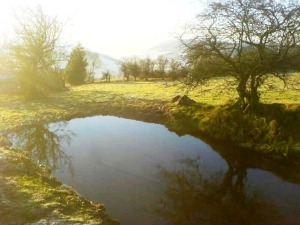The spring
THE SPRING

At Tair-Ffynnon, the spring was everything. It was the reason the smallholding was here, in this particular fold of this particular hill. It was how the place got its name (‘Three Springs’). Should anything happen to the spring, that would be that: the place would be uninhabitable. There was something magnificently primeval about it. It trickled steadily and unstintingly, swelling to a bucket-emptying gush in very wet weather (when our baths turned a peaty brown), reducing to an apologetic ribble in droughts, but never quite stopping … Only once had I glimpsed its source, discretely hidden behind a paving stone leaning against the steep bank where it emerged. The occasion had been a crisis brought on by a prolonged dry spell one August. Dreading that the spring had run dry, and unsure where to turn, I’d called the company that supplied our water filters. In response, Trevor had arrived in overalls and a plumber’s van, and I’d led him up to the springhead. I’d previously only dared take the briefest peek into this holy of holies—meddling with something so vital, on which my family and home were dependent, even looking at it without good reason, seemed not so much tempting Providence as prodding her with a sharp stick. Trevor suffered no such hang-ups. He heaved the paving stone aside, got down on his knees, reached into the bank and started scrabbling about amongst the stones, speaking, as he did so, of the dark art of spring-catching. ‘Sometimes they move,’ he said, just before his head disappeared into the bank. ‘But we can usually find them again.’ By this time he was stretched out on his stomach and, with only his |
headless torso visible, conversation was less easy. he seemed still to be talking, but his tone-of-voice had altered. Gone was the practical overalled technician who’d stepped out of the plumber’s van, replaced by some more nebulous practitioner—dowser, trout ticker, witch doctor? Soft, wheedling murmurings had begun to emerge from the bank. ‘Oh yes, we’ll find her … we’ll find you … won’t we, my pretty.’ Did he say that? I can’t be absolutely sure, but not being able to see his head of face, it was hard to tell. In any case, it was no longer clear whether he was addressing me, himself, the hill, the spring, or an obscure watery god. I half-wondered if he was entering a sort of trance. I monitored his body carefully in case it started vibrating or should begin to levitate. In the end, however, he’d merely withdrawn his head, straightened up, and said: ‘The pipe to the header tank is blocked. Chapter 14, The Pond
|

